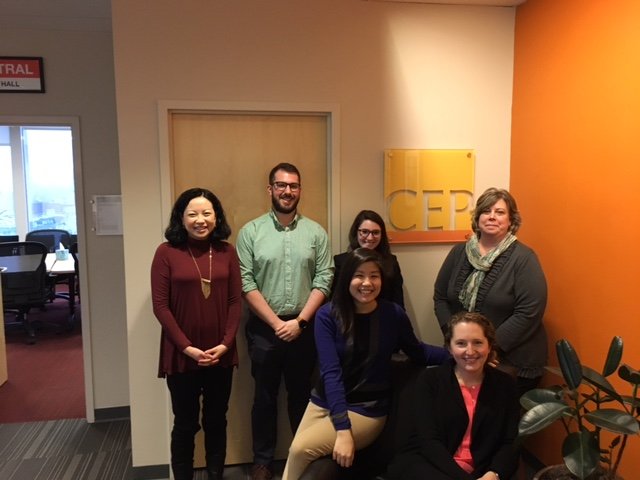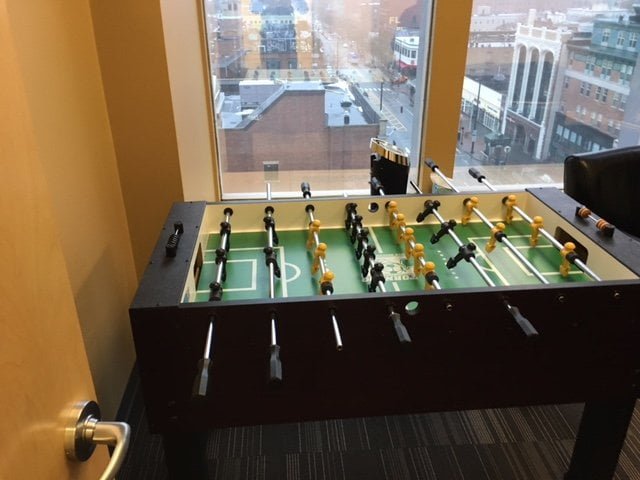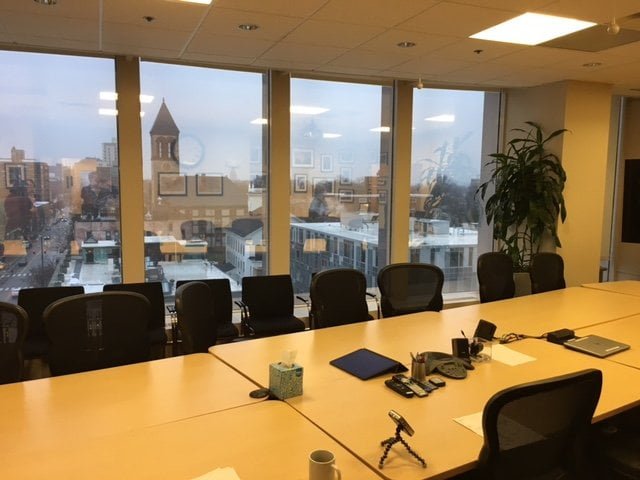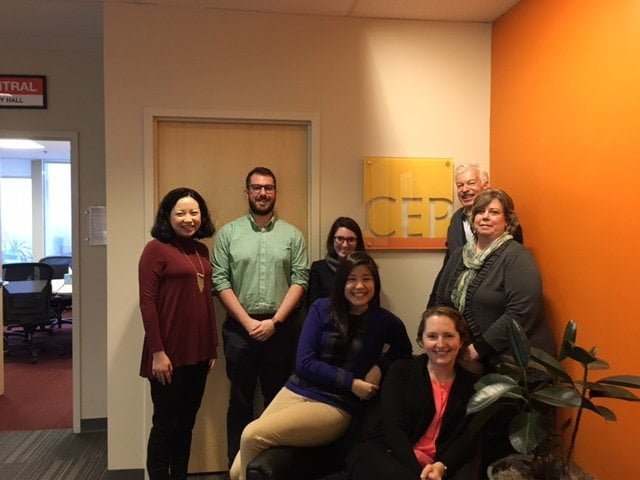Better Than Most is a regular feature of The Business of Giving examining the best places to work among social good businesses and nonprofit organizations.
Denver: For this edition of Better Than Most, we’re going to head up to Cambridge, Massachusetts in the shadows of Harvard University and to the offices of The Center for Effective Philanthropy or CEP. We’ll start with their President and CEO, Phil Buchanan who will tell you about the organization and then hear from members of their staff.

Phil: We were created about 15 years ago and our focus is to help foundations get better. We do that through the purchase of data and insight, through research on issues like foundation strategy, foundation performance assessment and then through assessment including feedback loops. Because if you are a foundation, you live in a bubble of positivity. Everybody tells you what they think you want to hear and one of the roles that The Center for Effective Philanthropy plays is to help provide candid comparative feedback that will allow foundations to understand how they’re really being experienced by grantees and others with whom they work.
Grace: When I first joined CEP, one of the things that I noticed was this ritual that we have before staff meetings which is called Shout Outs and now we called it Thank Yous and it’s basically five minutes where it’s an open time and people can say, “You know I just want to shout out to my colleague, Ethan. Ethan I really needed help with something this week and you really stepped in and I couldn’t have done it without you. So, thank you!” And everybody kind of cheers and claps and you know there’s nothing cynical about it. It’s very genuine and just a super encouraging time and I love that about CEP. I’m so glad that that’s been a part of our culture and continues to be. Another thing that I really loved about CEP is we’re really thoughtful about a focus on the employee. I’ve felt this deep sense of being really cared for since joining.

Charis: I really appreciate how CEP strives to glorify hard work but not overwork and I see work life balance being emphasized at all levels of the organization. About a year ago at staff retreat, so our President said, “You know, if one of your colleagues can leave the office at 5 PM, you should high-five them on the way out.” And that image stuck with me during my time here at CEP. So, whenever I feel that I finish my work and can leave early, I feel I’m contributing to CEP’s culture.
Alyse: We’ve also done a lot to make sure that we are not accidentally bringing extra bias into our process. So, things to remove implicit bias throughout the process include masking pieces of resumes, making sure that people are able to complete assessments before our folks meet them, so we can understand skill level without allowing bias of interview to creep in and things of that nature. So, I think that has helped us to be a stronger organization and make sure that we’re bringing on folks from a variety of backgrounds that would be good contributors to our organization.
Grace: The other piece that I think we don’t talk about a lot but I think is actually very unique to CEP’s that we each do have a professional development budget of $1,000 a year to use and I think that is a really special. I think that it really speaks volumes to how committed the organization is to each of our individual development and I’ve had many really helpful conversations with my supervisor about how I can grow both here at CEP and to reach my sort of broader career goal as well.
Ethan: So, you’re paired with someone who’s your mentor, who is on a different team from you, so it’s someone that you may not be interacting with in your work every single day and someone who has a different perspective on the work that CEP does perhaps than your colleagues directly on your team do and it’s a time where you can go out to get lunch or coffee twice a month for your first six months and it’s a time where you can really talk about anything.
Charis: I think what says a lot about an organization’s culture is what people do when things go awry and the senior management here at CEP are very transparent. They try to be as transparent as possible about the decisions that are made but they’re also transparent when there is a personal difficulty for example, about what they cannot be transparent about and I really appreciated being on the receiving end of that transparency because it removes any unnecessary fear that I have about my job and my role and expectations.
Chloe: But, here at CEP we actually have a culture document that dictates how we think and talk culture both internally and externally including in our hiring process and the way that that was developed was not sort of unilateral from leadership saying here is the culture that we have but it was across organizational task course that defined all of the different sort of metrics by which we judged whether we have the culture that we want or the culture that we sort of aspired towards, so that includes everything from sort of how mission-driven are we to work life balance as others have mentioned to how transparent we are in our communications. So, we’re very clear about sort of what we’re hoping to get out of our culture, so we’re not just talking about sort of interpersonal relationships when they think about what makes CEP special.

Ethan: Something, again I didn’t fully realize until I entered the working world is that you spent a lot of time with the people you work with, more so than your roommates, than your family. So, it’s really such an important thing that you enjoy each others company, you care for each other, you respect each other and you have fun together and I think that really comes through at CEP.
Charis: The first is the way that window cubes at CEP get allotted. There’s a row of cubes along that have the best window view and whenever one becomes vacant, we run something like a lottery for who gets to sit there and instead of defaulting to tenures saying the most senior person gets to have the cube, what we do instead balances both tenure and also allows a lucky newcomer to have a wonderful cube experience. We put one ballot for every year that you’ve worked at CEP, so the longer that you’ve worked at CEP, the higher chances you have of winning the lottery. It opens up the opportunity for someone who just joined to also have the experience. So, that’s one quirky story that gets add the balance that we strive to have at this organization.
Chloe: So, not only am I giving feedback on people I’ve managed on a project but there are allowed to get feedback on me and that’s actually encouraged and I found that having that sort of critical mass of feedback from people I’ve worked with in different capacities has been so valuable to my own personal growth because everyone has different perspectives on where I could improve, what my strengths are, what my opportunities for improvement are and I think that that’s been so crucial in something I didn’t realize was so important until I was sort of enmeshed in their culture.
Kris: I think what’s pretty rare in my work experience and it’s going to happen this week I think, so the President of the organization will ask us to actually watch him to give his presentation and provide feedback and critique and takes those things to heart and my change what the presentation entails and I just think that’s very rare to have that type of not only top to bottom but bottom to top feedback and I think that’s a great thing that we have here at CEP.
Alyse: For example, there was a staff meeting once where Phil, who’s our President and another employee came in to start the staff meeting by juggling and singing Oh Canada because they’re all from Canada which was an unusual way to start a meeting or when one point, we were doing a staff retreat and said, “Does anyone here have any special talents they can share?” And one of the staff people said, “I can read palms.” “Great! You can read palms.”, doing that to break time, so things like that. You’re just sort of free to be yourself and to be silly in the workplace at the same time that you’re not doing important work.

Denver: I want to extend a special thanks to Alyse D’Amico who organized all of this and to the others who participated as well: Grace Nicolette, Ethan McCoy, Charis Loh, Chloe Wittenberg, and Kris Sanda. Now if you go to denverfrederick.wordpress.com, we’ll have the podcast and transcript there, pictures of the participants and the CEP offices as well as my full interview with their President and CEO, Phil Buchanan.
The Business of Giving can be heard every Sunday evening between 6:00 p.m. and 7:00 p.m. Eastern on AM 970 The Answer in New York and on iHeartRadio. You can follow us @bizofgive on Twitter, @bizofgive on Instagram and at http://www.facebook.com/BusinessOfGiving

